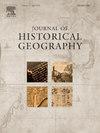Archiving and the aspirational politics of self-determination: Non-state claims to legitimacy amongst the Nagas in Northeast India
IF 1.1
2区 历史学
Q2 GEOGRAPHY
引用次数: 0
Abstract
Archives are paradigmatic state institutions. However, states are not the only actors to construct national archives: Indigenous, minority, and stateless groups also engage in archival practices. Yet, there is little analysis of how archives support these communities' geopolitical projects. To what extent can these groups harness archival power to produce subjectivities and legitimate political claims? What is the relationship between official state repositories and non-state actors' unofficial collections? How are such attempts at national archiving entangled with other ‘big space’ political projects, including internationalism? This paper explores how archives-as-institutions shape claims to political legitimacy and self-determination amongst Naga communities in Northeast India. It argues that archives undergird efforts to realise alternative Naga nationalist geopolitical futures. Drawing upon research with Naga twentieth-century collections, alongside interviews with Naga activists, I tell two archive stories. First, that of the ‘missing’ archival collection of the late Naga anticolonial nationalist leader Angami Zapu Phizo. By exploring the ongoing tensions over stewardship of Phizo's papers, I explain how, despite their inaccessibility, Phizo's archive looms large in Naga communities, illustrating how the (missing) archive informs contemporary Naga geopolitical imaginaries and claims to international recognition, and reproduces colonial relations between the Nagas and their international supporters. Second, efforts by Naga activists to construct an alternative Naga ‘national’ archive in Nagaland. By examining the space, materiality, and form of that collection, I illustrate how through archival curation Naga nationalists rehearse collective futures amidst political stasis. I conclude by describing the broader significance of archives as legitimacy-claiming instruments for non-state actors.
存档与自决的理想政治:印度东北部那加人的非国家合法性主张
档案馆是典型的国家机构。然而,国家并不是构建国家档案的唯一行为体:土著、少数民族和无国籍群体也参与档案实践。然而,很少有人分析档案是如何支持这些社区的地缘政治项目的。这些团体能在多大程度上利用档案力量来产生主观性和合法的政治主张?官方的国家存储库和非国家行为者的非官方集合之间的关系是什么?这种国家档案的尝试是如何与包括国际主义在内的其他“大空间”政治项目纠缠在一起的?本文探讨了档案作为机构如何在印度东北部的那迦社区中塑造政治合法性和自决的主张。它认为,档案为实现另一种纳迦民族主义地缘政治未来的努力提供了基础。根据对纳迦二十世纪藏品的研究,以及对纳迦活动家的采访,我讲述了两个档案故事。首先是“失踪”的已故那迦反殖民民族主义领袖安加米·扎普·菲佐的档案收藏。通过探讨Phizo档案管理的持续紧张关系,我解释了Phizo的档案如何在纳迦社区中若隐若现,尽管它们难以接近,说明了(失踪的)档案如何为当代纳迦的地缘政治想象提供信息,并要求得到国际承认,并再现了纳迦人与其国际支持者之间的殖民关系。第二,那迦活动人士努力在那加兰邦建立另一个那迦“国家”档案馆。通过研究这些藏品的空间、物质性和形式,我阐释了那迦民族主义者如何通过档案策展在政治停滞中排练集体的未来。最后,我描述了档案作为非国家行为体主张合法性的工具的更广泛意义。
本文章由计算机程序翻译,如有差异,请以英文原文为准。
求助全文
约1分钟内获得全文
求助全文
来源期刊

Journal of Historical Geography
Multiple-
CiteScore
1.50
自引率
10.00%
发文量
53
期刊介绍:
A well-established international quarterly, the Journal of Historical Geography publishes articles on all aspects of historical geography and cognate fields, including environmental history. As well as publishing original research papers of interest to a wide international and interdisciplinary readership, the journal encourages lively discussion of methodological and conceptual issues and debates over new challenges facing researchers in the field. Each issue includes a substantial book review section.
 求助内容:
求助内容: 应助结果提醒方式:
应助结果提醒方式:


